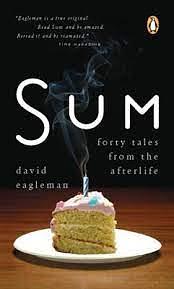You need to sign in or sign up before continuing.
Take a photo of a barcode or cover
The short stories in this collection (so short that they might better be termed fables or parables) deal primarily, as the title indicates, with the afterlife. Most of them are ingeniously imaginative and address, in a playful way, the ultimate question that almost all humans ask themselves: what happens to us after we die?
Eagleman doesn't write from any particular religious (or non-religious, for that matter) tradition or philosophical position but simply throws out different scenarios about the nature of the afterlife, and in some of his tales, there really isn't an afterlife--at least not for humans. In these stories, fanciful though they may be, about what lies beyond death, there is a great deal of insight about the human condition, and most of the tales address important issues in philosophy (particularly as concerns the nature of personal identity as well as important existential questions) and even in science, particularly biology, physics, and advanced computer technology.
Several of the tales that I particularly enjoyed reminded me of why I am completely content with the notion of my ceasing to exist forever when I die: the afterlife, if there is one (and I'm quite sure there's not one), may not be all it's cracked up to be.
This is a delightful short story collection, one that I highly recommend.
Eagleman doesn't write from any particular religious (or non-religious, for that matter) tradition or philosophical position but simply throws out different scenarios about the nature of the afterlife, and in some of his tales, there really isn't an afterlife--at least not for humans. In these stories, fanciful though they may be, about what lies beyond death, there is a great deal of insight about the human condition, and most of the tales address important issues in philosophy (particularly as concerns the nature of personal identity as well as important existential questions) and even in science, particularly biology, physics, and advanced computer technology.
Several of the tales that I particularly enjoyed reminded me of why I am completely content with the notion of my ceasing to exist forever when I die: the afterlife, if there is one (and I'm quite sure there's not one), may not be all it's cracked up to be.
This is a delightful short story collection, one that I highly recommend.
funny
lighthearted
reflective
fast-paced
Plot or Character Driven:
N/A
Strong character development:
N/A
Loveable characters:
N/A
Diverse cast of characters:
N/A
Flaws of characters a main focus:
Yes
My friend gave this to me for my birthday after noticing I had been moved by a quote from a book she shared about death and the afterlife, which was really thoughtful.
What a beautiful, funny little book. A book of 40 very short stories on different versions of the afterlife — ones that shine a light on how we live life here on earth more than they do about what will happen after it. Some I absolutely loved (the afterlife being you reliving your whole life — just in reverse, the afterlife being full of all the versions of you, the afterlife being the memories people have of us — which is something I’ve thought about often myself — to name a few) some I felt lukewarm about, some felt a bit repetitive.
Overall though, I really enjoyed it and found myself underlining many parts of the book. Makes you reflect on what it is you’d like to do with your one life while you have it and simply what it means to be human.
What a beautiful, funny little book. A book of 40 very short stories on different versions of the afterlife — ones that shine a light on how we live life here on earth more than they do about what will happen after it. Some I absolutely loved (the afterlife being you reliving your whole life — just in reverse, the afterlife being full of all the versions of you, the afterlife being the memories people have of us — which is something I’ve thought about often myself — to name a few) some I felt lukewarm about, some felt a bit repetitive.
Overall though, I really enjoyed it and found myself underlining many parts of the book. Makes you reflect on what it is you’d like to do with your one life while you have it and simply what it means to be human.
I love to collect examples of people who have disparate careers. I've heard of an airline steward/dentist and an opera singer/graphic designer. David Eagleman is a new entry to my list. A neuroscientist, he also writes fiction. So the shortness of the this volume can be excused by the fact that he has an incredibly busy day job.
The stories bring to mind Italo Calvino and Jorge Luis Borges. They are fascinating examples of possible afterlives. And sometimes, as in Borges' The Lottery in Babylon, it seems the descriptions are as much about our existence as they are about death. Fascinating and elegantly written - I look forward to reading more from this author.
The stories bring to mind Italo Calvino and Jorge Luis Borges. They are fascinating examples of possible afterlives. And sometimes, as in Borges' The Lottery in Babylon, it seems the descriptions are as much about our existence as they are about death. Fascinating and elegantly written - I look forward to reading more from this author.
A collection of forty short texts describing different possible afterlives that gives you a few gems here and there, but also leaves a lot to be desired. The characters are completely anonymous - which is fine. This is simply a collection of thought experiments.
In one story we are atoms in Gods body, in another the dead are not allowed to rest until everyone alive have forgotten about them (Shakespeare must be pretty mad by now if this one turns out to be true). There are a lot of stories circling around the theme of a creator or deity not being perfect. Not being in absolute control, not being able to fix everything or make everybody happy. Or even being able to understand their own creations.
In one of the better ones, God's favorite book is Mary Wollstonecraft Shelly's Frankenstein, because:
God considers Himself to be a medical doctor, a biologist without parallel, and He has a deep, painful relationship with any story about bringing animation to the unanimated. Very few of His creatures had thought deeply about the challenges of creation, and it relieved Him a little of the loneliness of his position when Mary wrote her book.
The stories try their best to twist and turn our ideas and expectations about life, afterlife and being human. Or being God. Usually there is a twist at the end that shows the downside or the unexpected results of some specific organization of life or afterlife.
In the beginning the inventiveness was great, but around the midway point I found my enthusiasm for this collection quickly plummeting. The further I read, the more I got the feeling that the book tried too hard to be clever and deep, and no longer succeeding, like in the first stories. It was also starting to become a bit too repetitive - to many variations on the same themes. I got the impression - like with so many short story collections, it seems - that the best stories were placed in the front of the book, to get you hooked, and then all the mediocre ones were doled out towards the middle and end. But let me add that the further I read, the less I dwelled on each story. The book might have benefited from me only reading one story a day.
So, the concept itself is great, and a few of the stories I really loved, but by the end, this was a bit of a disappointing read.
In one story we are atoms in Gods body, in another the dead are not allowed to rest until everyone alive have forgotten about them (Shakespeare must be pretty mad by now if this one turns out to be true). There are a lot of stories circling around the theme of a creator or deity not being perfect. Not being in absolute control, not being able to fix everything or make everybody happy. Or even being able to understand their own creations.
In one of the better ones, God's favorite book is Mary Wollstonecraft Shelly's Frankenstein, because:
God considers Himself to be a medical doctor, a biologist without parallel, and He has a deep, painful relationship with any story about bringing animation to the unanimated. Very few of His creatures had thought deeply about the challenges of creation, and it relieved Him a little of the loneliness of his position when Mary wrote her book.
The stories try their best to twist and turn our ideas and expectations about life, afterlife and being human. Or being God. Usually there is a twist at the end that shows the downside or the unexpected results of some specific organization of life or afterlife.
In the beginning the inventiveness was great, but around the midway point I found my enthusiasm for this collection quickly plummeting. The further I read, the more I got the feeling that the book tried too hard to be clever and deep, and no longer succeeding, like in the first stories. It was also starting to become a bit too repetitive - to many variations on the same themes. I got the impression - like with so many short story collections, it seems - that the best stories were placed in the front of the book, to get you hooked, and then all the mediocre ones were doled out towards the middle and end. But let me add that the further I read, the less I dwelled on each story. The book might have benefited from me only reading one story a day.
So, the concept itself is great, and a few of the stories I really loved, but by the end, this was a bit of a disappointing read.
Easy to read, low commitment, but still thought provoking.
Not meant to posit actual theories of the afterlife, but serves to illuminate the present from a different dimension. Parables. Recurring theme of applying modern concepts to the afterlife, whether it's business or technology.
Definitely written from the perspective of a scientist; the stories inevitably ground us in the intricacies of the empirical world while offering us revelations that seem inexplicable by sole reference to that empirical world. All the same, the ineffable beauty of human consciousness & relationships all serve the thesis of a life that is designless and for the present... Ultimately the idea that finding The Meaning does not really matter so much as enjoying the present and its own mysteries. Definitely ignites a wonder for human life and reconsider the things we take for granted.
Prose is smooth, straightforward. I wouldn't call it lyrical or particularly beautiful; the images the author creates are the whole point, and he does a great job choosing the right words for it. It's an easy read but it's never banal. I would say he has a knack for metaphors, and creating layers and depth to support a single concept.
Favorite stories:
-Ineffable : I felt this story tangibly when communities were broken up due to the pandemic.
-Impulse : I love the idea of human beings influencing one another at a subconscious level and that having a butterfly effect
-Conservation : An alternate, physics take to the Big Bang. Incredible imagery.
-Reversal : Delightful concepts, all fitting nicely together. 'On their last day, howling because it is the end of their lives, babies climb back into the wombs of their mothers, who eventually shrink and climb back into the wombs of their mothers, and so on like concentric Russian dolls.'
Favorite quotes:
-'Of all the Programmers' planets, ours is the supercomputing golden child, the world that inexplicably provides enough power to light up the galaxy.' (81)
-'He began to find humans irresistible with their unrestricted love. We quickly became His chosen species.' (93)
-'But here they no longer enjoy the peak of a hierarchy; instead, they suffer side by side in a fellowship of abandonment.' (98)
-'The secret codes of life- whether presented as a gift or a burden- go totally unappreciated. And once again the Rewarder and the Punisher skulk off, struggling to understand why knowing the code behind the wine does not diminish its pleasure on your tongue, why knowing the inescapability of heartache does not reduce its sting, why glimpsing the mechanics of love does not alter its intoxicating appeal.' (103)
Misc. facts:
-Many forms of the word 'genuflect' appear in this book.
-This book was recommended to my mom by a professor who is a part of a weekly book club of older gentlemen who meet at a bar in town.
Not meant to posit actual theories of the afterlife, but serves to illuminate the present from a different dimension. Parables. Recurring theme of applying modern concepts to the afterlife, whether it's business or technology.
Definitely written from the perspective of a scientist; the stories inevitably ground us in the intricacies of the empirical world while offering us revelations that seem inexplicable by sole reference to that empirical world. All the same, the ineffable beauty of human consciousness & relationships all serve the thesis of a life that is designless and for the present... Ultimately the idea that finding The Meaning does not really matter so much as enjoying the present and its own mysteries. Definitely ignites a wonder for human life and reconsider the things we take for granted.
Prose is smooth, straightforward. I wouldn't call it lyrical or particularly beautiful; the images the author creates are the whole point, and he does a great job choosing the right words for it. It's an easy read but it's never banal. I would say he has a knack for metaphors, and creating layers and depth to support a single concept.
Favorite stories:
-Ineffable : I felt this story tangibly when communities were broken up due to the pandemic.
-Impulse : I love the idea of human beings influencing one another at a subconscious level and that having a butterfly effect
-Conservation : An alternate, physics take to the Big Bang. Incredible imagery.
-Reversal : Delightful concepts, all fitting nicely together. 'On their last day, howling because it is the end of their lives, babies climb back into the wombs of their mothers, who eventually shrink and climb back into the wombs of their mothers, and so on like concentric Russian dolls.'
Favorite quotes:
-'Of all the Programmers' planets, ours is the supercomputing golden child, the world that inexplicably provides enough power to light up the galaxy.' (81)
-'He began to find humans irresistible with their unrestricted love. We quickly became His chosen species.' (93)
-'But here they no longer enjoy the peak of a hierarchy; instead, they suffer side by side in a fellowship of abandonment.' (98)
-'The secret codes of life- whether presented as a gift or a burden- go totally unappreciated. And once again the Rewarder and the Punisher skulk off, struggling to understand why knowing the code behind the wine does not diminish its pleasure on your tongue, why knowing the inescapability of heartache does not reduce its sting, why glimpsing the mechanics of love does not alter its intoxicating appeal.' (103)
Misc. facts:
-Many forms of the word 'genuflect' appear in this book.
-This book was recommended to my mom by a professor who is a part of a weekly book club of older gentlemen who meet at a bar in town.
Some of the scenarios are trivial, but overall this a stimulating tiny book
3.5
Thought experiments about death and our existence
Some of my favorite to consider:
- being reborn as a creature with simpler thoughts and feelings, but not being able to appreciate it because you no longer have the comparison of human thoughts and feelings
- being part of larger organism - so small that she (the giantess) may not even be able to conceptualize your existence
- waiting years and years at a terminal until your name is spoken for the last time (your third death)
- being created by lesser creatures, who ask us to provide the answer/meaning of it all (and we don't know any better than they do)
- human life as a vacation from maintaining the cosmos - a time to capture the small experiences
- God is on the microbe level and our machinations are the unknowns of the microbe world
Thought experiments about death and our existence
Some of my favorite to consider:
- being reborn as a creature with simpler thoughts and feelings, but not being able to appreciate it because you no longer have the comparison of human thoughts and feelings
- being part of larger organism - so small that she (the giantess) may not even be able to conceptualize your existence
- waiting years and years at a terminal until your name is spoken for the last time (your third death)
- being created by lesser creatures, who ask us to provide the answer/meaning of it all (and we don't know any better than they do)
- human life as a vacation from maintaining the cosmos - a time to capture the small experiences
- God is on the microbe level and our machinations are the unknowns of the microbe world
adventurous
challenging
funny
informative
inspiring
mysterious
reflective
fast-paced
adventurous
dark
emotional
funny
reflective
fast-paced
Plot or Character Driven:
N/A
Strong character development:
Complicated
Loveable characters:
Complicated
Diverse cast of characters:
Complicated
Flaws of characters a main focus:
Yes





